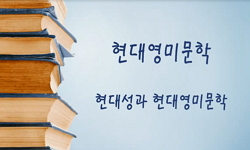This study set out to investigate the meanings of diverse fantasy texts in modern novels through the patterns of transformation motif by analyzing how fantasy was formed in what networks with the reality of the times. The same transformation motif can...
http://chineseinput.net/에서 pinyin(병음)방식으로 중국어를 변환할 수 있습니다.
변환된 중국어를 복사하여 사용하시면 됩니다.
- 中文 을 입력하시려면 zhongwen을 입력하시고 space를누르시면됩니다.
- 北京 을 입력하시려면 beijing을 입력하시고 space를 누르시면 됩니다.
https://www.riss.kr/link?id=A76616807
- 저자
- 발행기관
- 학술지명
- 권호사항
-
발행연도
2009
-
작성언어
-
-
주제어
환상 ; 변신 모티프 ; 문학교육 ; 전후세대 ; 비판의식 ; 산업화 시대 ; 소외 ; 소통 부재 ; 1990년 세대 ; 다원화의식 ; 장용학 ; 최인훈 ; 최인호 ; 김영하 ; 송경아 ; 한강 ; Fantasticality ; Literary Education ; transformation motif ; fantasy texts ; post-war generation ; industrialization era ; critical awareness ; alienation ; absence of c
-
KDC
800
-
등재정보
KCI등재
-
자료형태
학술저널
- 발행기관 URL
-
수록면
67-93(27쪽)
- 제공처
-
0
상세조회 -
0
다운로드
부가정보
다국어 초록 (Multilingual Abstract)
This study set out to investigate the meanings of diverse fantasy texts in modern novels through the patterns of transformation motif by analyzing how fantasy was formed in what networks with the reality of the times. The same transformation motif can manifest itself in diverse meaning changes as the aspects of the times are reflected and thus contribute to the broader horizon of fantasy literature. Subversiveness, one of the characteristics of fantasy literature defined by Jackson, lies in the vein of the logic of resistance discourse, which offers crucial implications for the reasons behind today`s modern authors` interest in fantasy. The study focused on the works by Jang Yong-hak, Choi In-hun, Choi In-ho, Kim Yeong-ha, Song Gyeong-a, Oh Su-yeon, and Han Kang. The transformation motif in Yeokseongseoseol by Jang Yong-hak and Guwoonmong by Choi In-hun leads the way to the fantasy to reveal the critical awareness of the post-war generation. The Room of Others by Choi In-ho has the characteristics of a fantasy text to show alienation and absence of communication in the industrialization era. In the 1990s authors` interest in fantasy increased both in quality and quality. By reviewing High-Tension Lines, Books, Invisible Man, Bugs, and Fruit of My Lady, the investigator found out that the fantasy texts reflected the diverse aspects of society.
동일학술지(권/호) 다른 논문
-
개인발표 : <효 불효 다리>의 반응을 통해 본 우울성향 자기서사의 양상
- 한국문학교육학회
- 조은상 ( Eun Sang Cho )
- 2009
- KCI등재
-
개인발표 : 김동리 소설과 화개 -「역마(驛馬)」에 대한 새로운 해석을 중심으로-
- 한국문학교육학회
- 정호웅 ( Ho Ung Jung )
- 2009
- KCI등재
-
- 한국문학교육학회
- 나희덕 ( Hee Duk Ra )
- 2009
- KCI등재
-
개인발표 : 맥락 중심의 시 창작 교육 -비유적 발상을 중심으로-
- 한국문학교육학회
- 정정순 ( Jung Soon Jung )
- 2009
- KCI등재





 KCI
KCI KISS
KISS






